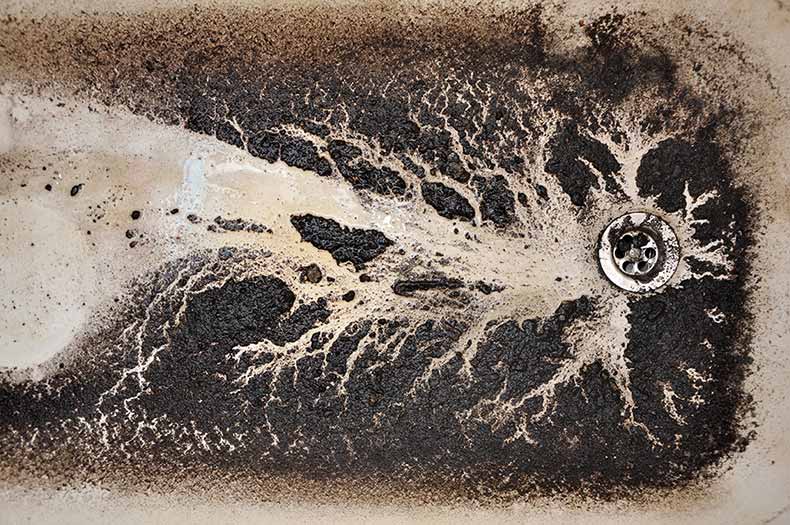Uncovering the Causes of Drainage Backflow in the Bathtub
Uncovering the Causes of Drainage Backflow in the Bathtub
Blog Article
They are making a few good annotation about Why sewage is coming up through your bathtub as a whole in this content directly below.

Sewer back-up in the bath tub can be an upsetting and unsanitary problem for any house owner. Not only is it troublesome, but it likewise positions major health dangers and indicates underlying problems with the plumbing system. Recognizing why sewage is turning up through the tub is crucial for taking ideal activity to address the issue effectively.
Introduction to the Problem
Understanding the Problem
When sewage starts backing up into the bathtub, it's a clear indicator of a trouble with the water drainage system. The wastewater that ought to be flowing away from your home is rather locating its way back into your living space, which can result in considerable damage and carcinogen.
Possible Reasons
A number of factors can contribute to sewer backup in the bath tub. From clogs in the sewage system line to problems with the plumbing facilities, recognizing the origin is essential for locating an option.
Typical Reasons for Sewer Back-up
Blockages in the Sewer Line
Among one of the most typical causes of sewage backup is a clog in the sewer line. This can happen as a result of the build-up of debris, grease, or foreign items in the pipes, protecting against correct circulation and creating sewage to back up right into your bathtub.
Tree Origin Intrusion
Tree origins seeking moisture and nutrients can penetrate sewer lines with tiny fractures or joints. Over time, these origins can grow and increase, triggering substantial damage to the pipes and resulting in sewage backup problems.
Aging Facilities
Older homes may have obsoleted plumbing systems that are a lot more vulnerable to corrosion, fractures, and wear and tear. As pipelines age, they end up being extra vulnerable to leaks and obstructions, enhancing the likelihood of sewage backup occurrences.
Heavy Rainfall or Flooding
Throughout periods of heavy rainfall or flooding, the drain system may become overloaded with excess water, triggering back-ups and overflows. This can cause sewage supporting right into bathtubs and various other fixtures inside the home.
Wellness Threats Connected With Sewage Backup
Contamination of Water
Sewage backup can contaminate the water system in your house, positioning a major health risk to you and your family members. Exposure to contaminated water can cause stomach concerns, skin infections, and various other health problems.
Spread of Condition
Sewer includes hazardous microorganisms, infections, and parasites that can trigger a series of illness, consisting of liver disease, cholera, and gastroenteritis. Entering contact with sewer or contaminated surfaces puts you in danger of infection.
Mold Growth
Dampness from sewage back-up can produce ideal problems for mold development in your home. Mold and mildew spores can exacerbate respiratory system issues and trigger allergies in delicate individuals, making timely clean-up necessary.
Signs of Sewage Backup
Foul Odors
Unpleasant smells rising from drains or components, especially in the shower room, might suggest sewer back-up issues. These odors are typically strong and consistent, signifying a problem that requires immediate attention.
Slow Draining Fixtures
Bathtubs, sinks, and bathrooms that drain gradually or not in all could be experiencing sewer back-up. If numerous components are affected at the same time, it's likely that the issue stems from an usual factor, such as the main sewage system line.
Gurgling Noises
Unusual gurgling or gurgling noises coming from drains pipes when water is running in other places in your house are indicative of air trapped in the plumbing system. This air buildup can result from sewer backup and should be investigated promptly.
Immediate Actions to Take
Turning Off Water Supply
In the event of sewer back-up, it's necessary to turn off the water to prevent additional contamination and damage. Situate the primary water shutoff valve in your house and shut it off until the issue can be resolved.
Speaking To a Specialist Plumber
Taking care of sewer back-up is not a DIY work. Get in touch with a qualified plumber with experience in managing sewage-related problems to evaluate the scenario and execute needed repair work or cleanings.
Preventing Contact with Contaminated Water
Till the sewage backup is resolved, avoid contact with polluted water to stop the spread of bacteria and microorganisms. Put on protective gear if you have to be in the affected area and clean your hands thoroughly later.
Safety nets
Normal Upkeep of Sewage System Lines
Schedule normal evaluations and maintenance of your sewer lines to recognize and address potential problems before they rise into significant problems. This can include cleaning out particles, examining for tree origin invasion, and fixing any damaged pipelines.
Setting Up Backwater Valves
Consider installing backwater valves in your plumbing system to avoid sewer from receding right into your home during periods of heavy rainfall or flooding. These shutoffs instantly close when water starts backing up, shielding your home from contamination.
Appropriate Disposal of House Waste
Avoid purging anything other than toilet paper and human waste down the toilet to stop blockages and obstructions in the drain line. Dispose of grease, oil, and other home chemicals effectively to lessen the danger of plumbing problems.
Tidying up After Sewer Back-up
Sanitation Procedures
Extensively disinfect and disinfect affected locations after sewage back-up to remove harmful microorganisms and avoid mold and mildew growth. Use ideal cleansing items and protective gear to make certain secure and reliable cleanup.
Remediation of Affected Areas
Repair any damage to flooring, wall surfaces, or fixtures triggered by sewage backup. Relying on the level of the damages, you may require to replace carpeting, drywall, or various other materials to recover your home to its pre-loss condition.
Why is There Sewage Coming Up Through the Bathtub
Sewage in your bathtub is a major problem that can make you want to abandon the bathroom for good. You don’t have to. However, it is important to identify the source of the issue and take the necessary steps to resolve it in order to avoid any health risks and property damage. In this article, we will discuss what could be causing sewage to back up through your bathtub so you can take action quickly and effectively.
The Main Reason For Sewage Backup in The Bathtub
All the sinks and toilets in your home connect to different pipes that lead to the main sewer line. The sewer line then connects to the municipal sewer system. This connection works seamlessly on a daily basis, but there can sometimes be a problem with the main sewer line.
The most common cause of sewage backup is a clogged or blocked main sewer line. The main sewer line can be clogged due to the accumulation of debris, tree roots or grease buildup, or other materials. Another possible cause is a collapsed pipe. When this happens, your toilets and sinks won’t be able to drain properly. This is when sewage starts backing up through the bathtub. If the problem has been occurring for some time now, it might be time to consult with a plumber as there may be more severe damage that needs fixing.
How Can You Tell if it’s Coming From Your Sewer Line?
If you’re experiencing a sewage backup in your bathtub, then you can use a few simple methods to determine if it is coming from the main sewer line. First, try to unclog the tub drain with a plunger or an auger and see if that helps. If not, then inspect all of the drains in your house and check if there is any blockage in them. If some of the other drains are not working fine, then it’s likely the problem is with your main sewer line.
Common Signs of a Clogged Main Sewer Line
If you suspect that your main sewer line is blocked, then there are a few common signs to look out for. Frequent clogs in your home are a sure sign of a clogged sewer line. You can also check for slow drainage from all the plumbing fixtures.
Slow Drains
If you notice that it takes longer for your sinks and toilets to drain, then this could be a sign of a clogged main sewer line.
Frequent Clogs
Another common sign is that your drains or toilets become clogged almost all of the time. If this happens, then it could be a sign that the main sewer line is blocked.
Water Backup
Do you notice water or sewage coming back up from any of the drains in your home? If your answer is yes, you may have a clogged main sewer line.
Sinkholes
If you’ve noticed sinkholes in your yard or overflowing sewage from the ground, you may be facing a blocked sewer line issue.
Your Shower or Sink Makes Gurgling Noises
Have you noticed gurgling noises coming from your sink or shower lately? These are typically signs of a blocked sewer line and should be checked out immediately.
How to Prevent a Main Sewer Line Clog
Once you’ve identified that your main sewer line is clogged, it’s important to take steps to prevent it from happening again. The best way to do this is to avoid putting any solid material that can clog the drain, such as grease and other debris. You should also be mindful of what you flush down your toilet. In addition, you should schedule regular maintenance for your main sewer line. This will help keep it clear and free from clogs or backups.
What Should You do if You Notice Sewage Backing up Through The Bathtub?
If you’ve noticed sewage backing up through the bathtub, then it is important to call a professional plumber immediately. A plumber can inspect the situation and determine what the cause is, such as a blocked main sewer line. They will also be able to advise you on how best to fix the issue. In some cases, a simple drain cleaning may be all that is needed.
However, if the blockage is severe, then your plumber may need to use more advanced methods to clear the blockage.
No matter what, it is important to always call a professional plumber if you experience any kind of sewage backup. They will be able to assess the situation and provide you with a solution that is best for your home.
https://baylorinc.com/blog/why-is-there-sewage-coming-up-through-the-bathtub/

Hopefully you enjoyed our piece about . Thanks for taking the time to read our posting. Are you aware of anybody else who is serious about the subject? Be sure share it. Thank-you for your time invested reading it.
Get Quote
Report this page